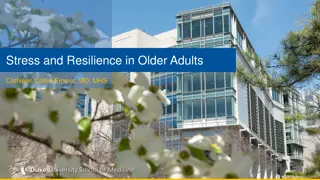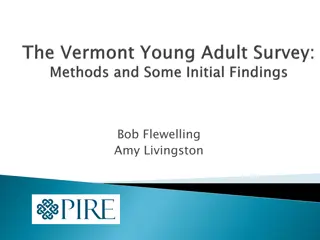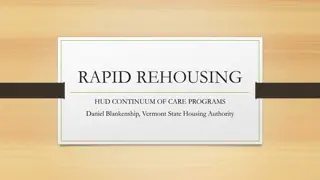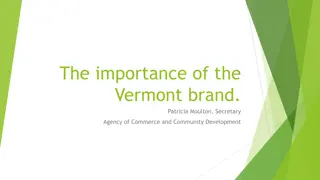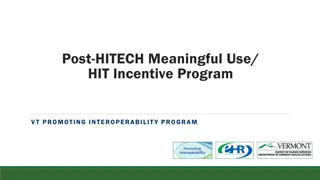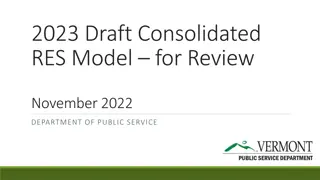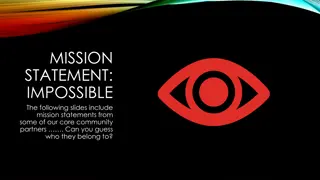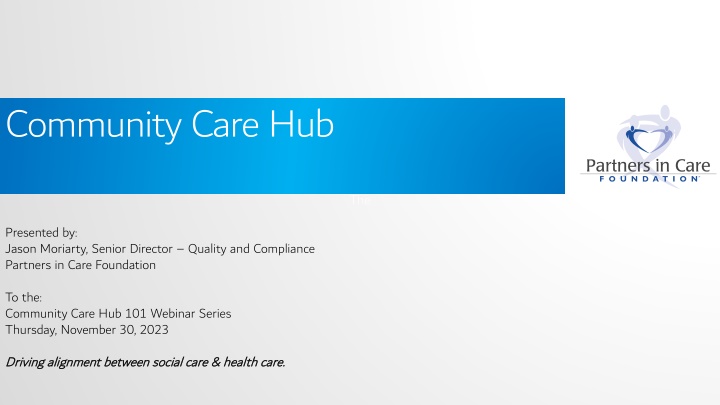
Municipal Energy Resilience Program for Vermont's Buildings and Facilities
Vermont's Municipal Energy Resilience Program aims to replace fossil fuel heating systems with renewable and efficient ones in over 2,000 municipal buildings. The program includes grants for energy assessments and implementation projects, fostering resilience and sustainability.
Download Presentation

Please find below an Image/Link to download the presentation.
The content on the website is provided AS IS for your information and personal use only. It may not be sold, licensed, or shared on other websites without obtaining consent from the author. If you encounter any issues during the download, it is possible that the publisher has removed the file from their server.
You are allowed to download the files provided on this website for personal or commercial use, subject to the condition that they are used lawfully. All files are the property of their respective owners.
The content on the website is provided AS IS for your information and personal use only. It may not be sold, licensed, or shared on other websites without obtaining consent from the author.
E N D
Presentation Transcript
Community Care Hub The Presented by: Jason Moriarty, Senior Director Quality and Compliance Partners in Care Foundation To the: Community Care Hub 101 Webinar Series Thursday, November 30, 2023 Driving alignment between social care & health care. Driving alignment between social care & health care. PARTNERS IN CARE FOUNDATION
What Is A Community Care Hub (CCH)? Contracting with health plans and providers requires a heavy lift from community agencies. Infrastructure requirements include: Contracting skills, robust billing and contract management systems, insurance coverage, information technology resources, policies and oversight to address a wide range of quality and compliance issues. The Community Care Hub allows organizations to avoid duplicating that infrastructure, consolidating those functions in an anchor agency. This arrangement frees resources within all organizations to focus on their unique strengths providing trusted services within their communities by addressing the human side of complex health and social conditions in daily life. PARTNERS IN CARE FOUNDATION
Community-Based Organizations (CBOs) Stronger Together CBOs Alone Specialized expertise in the care of individuals with specific conditions Diverse care teams who understand the needs of the people they serve Deep community connections with access to resources Smaller and more adaptable organizational structures Less overhead to dedicate to contracting, billing, training/oversight etc. sometimes, not always! CBOs Together in a Hub All the strengths of CBOs alone, plus: Consolidated contracting and billing for greater efficiency/cost effectiveness Increased referrals from multiple health plans Additional resources for training and quality oversight Access to a broad network of other CBOs with geographic, cultural, and condition expertise PARTNERS IN CARE FOUNDATION
Who Are Partners in Care Foundation Twenty-five years of social care innovation - working to build new models of care that align social care and health care. Community-based organization providing long and short-term supports and services, community education, and more. Always Innovating our mission is to serve as a change agent to transform the way health and social care services are delivered. We began developing the CCH as a new delivery system more than 10 years ago to help individuals with complex health and social needs by linking them with community supports and services. PARTNERS IN CARE FOUNDATION
Partners Community Care Hub (CCH) Partners CCH Covers all 58 California counties With over 40 community specialty providers Experienced contracting with health plans and health care providers A national leader in the development and implementation of CCH Member agencies understand the communities, cultures, languages, and specific challenges/needs of the people they serve Partners CCH Services Offered Through CCH Short-term social care coordination/care management Private Duty Services (in-home non-medical respite services, personal care and homemaker services) Enhanced Care Management Care Transitions Meals PARTNERS IN CARE FOUNDATION
Partners in Care Foundations CCH Role as an Anchor Agency Existing contracts with health plans Thoughtful, efficient, user-friendly workflows and technology systems Billing, service reconciliation, and payment for services Coordination and management of network of community care providers Statewide coverage Oversight and review of licensing and certification Quality Assurance (Partners is NCQA-accredited) Staff training and coordinated oversight Single point of entry for all referrals PARTNERS IN CARE FOUNDATION
Community-Based Organizations CCH Role Community connections to help individuals whose health is fragile - and whose care is complex and costly - remain in their home and local community, avoiding costly institutionalized care Specialized experience needed to care for specific populations or to address certain complex health or social conditions Staff with community, cultural, and linguistic expertise, including Community Health Workers, Case Managers, Coordinators, Coaches, Nurses, Caregivers, Health Self Management Instructors, Home Care Aids Partners in Care Foundation also serves as a CBO within the hub, in addition to serving as the anchor agency PARTNERS IN CARE FOUNDATION
Training and Supervision of Hub Member Staff One of the benefits of working within the CCH is that hub staff receive the same mandatory and optional trainings as Partners internal staff, providing a foundation based on 25 years of experience. Hub staff also receive supervision for their case management activities that is supplemental to that provided by the Hub Member. What Hub supervision covers monthly contact requirements, sufficiency of charting and case management activities, access to interdisciplinary care team (ICT) meetings for dealing with complex cases What Hub supervision payroll What Hub supervision covers: timeliness of assessment and care planning, monitoring of What Hub supervision does not does not cover: cover: disciplinary actions, human resources, timekeeping and PARTNERS IN CARE FOUNDATION
Referrals and Caseload Determinations The Community Care Hub strives to provide its members with caseloads in a fair and transparent process Assuming there is capacity to take on new participants, new cases are allocated to Hub Members based on the members needs, including special health or social needs, their language preferences, their geographic location, etc. When two or more Hub Members can meet a participants needs, cases are allocated on a round robin basis. As a Hub Member, Partners does not receive special prioritization for caseloads. When a Hub Member refers an individual into the CCH, they may elect to add that participant directly to their caseload or they may refer them to the CCH allocation process if they have needs the Hub Member cannot meet. PARTNERS IN CARE FOUNDATION
Thank You! For more information, feel free to contact: Ester Sefilyan Vice President esefilyan@picf.org Marie Rivas Director Partners Hub mrivas@picf.org Driving alignment between social care & health care. Driving alignment between social care & health care. PARTNERS IN CARE FOUNDATION


